初中英语短语词汇的解析
中考英语1600词汇详解(教师版)

中考1600词汇详解Aa (an) art. 一个,某个,任何一个用法:不定冠词的常见用法:1)第一次提到,表示泛指。
2)含有数量“一”的概念,但是不如one 强烈。
ability n.能力;才干;才能短语:1. a man of ability 有能力的人2. the ability to do sth 做某事的能力able adj.有才干的;聪颖的短语:1. be able to do sth有能力做某事about prep. 对于,关于;大约;在….周围;短语:1. be about to 即将2.look about3.run about4.What/How about…?above prep. adj.在…之上;超过;大于,多于; 上面的;短语:1.above all 最重要的注意:above的反义词为belowabroad adv. 在外国;广泛地;传播短语:1. from abroad 从国外,从海外2. go abroad 出国accept v.接受;赞同;欢迎;听从近义词辨析:accept 和receiveaccept 是“接受、认可“的意思,是收到并接受;receive 有”收到“的意思,但不一定接受。
accident n. 事故;偶然短语:1.by accident意外地,偶然地2.a traffic accident 交通事故according to prep.根据…;依照achieve v. 实现;达到;完成across prep.在…对面近义词辨析:across 和throughacross表示“横过,穿过”;着重指从路线或物体表面的一边到另一边(表面)。
through “穿过,从……中间通过”;着重指从空间的一头穿到另一头(内部)。
act n. & v. 行为;举动;假装;短语:1.act as担任(起...作用)词性转换:actor/actress n.男演员/女演员action n. 行动;有能量;行为;active adj. 积极的;短语:1. take an active part in : 积极参加activity n. 活动;工作;职业add v. 添加;增加;合计;相当于短语:1. add to;2.add up3.add up to4.add…to…address n. 地址;住址;演说;讲话advantage n. 优点;利益advertisement (ad) n.公告;启事;广告advice n. 建义,劝告;信息短语:1.a piece of advice一条建议2.ask for advice 寻求建议3.give advice提建议4.take/follow one’s advice接受、遵照某人的建议advise v.给…出主意;建议;通知短语:1.advice sb to do sth 建议某人做某事afraid adj. 惊慌的;恐怕短语:1.be afraid of 害怕2. be afraid for 担心3. I’m afraid so. /I’m afraid not. /I’m afraid that….after adv., prep & con j. 在…之后;晚于短语:after all1) 终究,毕竟afternoon n. 下午;午后短语:1. in the afternoon2. on Monday afternoon3. on the afternoon of…again adv. 再一次;加之,此外;短语:1. again and again 一次又一次地,反复地,再三地2. now and again 有时against prep. 1)对着,反对;2)靠着,依着:age n. 年龄;时期;变老;短语:1. for one’s age 论年龄2. at the age of 在…岁时ago adv. 以前;以往;短语:1. long ago 很久以前,从前:2. some time ago 不久前3. a while ago. 刚才近义词辨析:ago 和beforeago: 应注意两点:1.用于一般过去时;2. 它所指的时间是从现在算起。
初中英语知识点总结通俗版

初中英语知识点总结通俗版一、词汇与短语1. 基础词汇:掌握日常生活中常用的名词、动词、形容词、副词、代词等。
2. 短语动词:如look after, take off, turn on等,注意短语动词的使用场景。
3. 常见短语:如make a decision, have a try, all kinds of等,理解并运用在句子中。
二、语法1. 时态:- 一般现在时:表示经常性或习惯性的动作。
- 一般过去时:描述过去发生的事情。
- 现在进行时:表示正在进行的动作。
- 过去进行时:表示过去某个时间点正在进行的动作。
- 一般将来时:表示将来会发生的动作。
- 现在完成时:表示过去发生的动作对现在的影响或结果。
2. 语态:- 被动语态:当动作的承受者成为句子的主语时使用。
3. 非谓语动词:- 动名词:作为名词使用,如Reading is fun.- 分词:现在分词和过去分词,用作形容词或副词。
- 不定式:作为名词、形容词、副词等使用。
4. 代词:- 人称代词:主格和宾格的使用。
- 物主代词:形容词性物主代词和名词性物主代词。
- 反身代词、指示代词、疑问代词等。
5. 冠词:- 不定冠词a/an的用法。
- 定冠词the的用法。
- 零冠词的情况。
6. 介词:- 表示时间、地点、方向等的介词,如at, in, on, to, for等。
- 介词短语的运用。
7. 连词:- 并列连词:and, but, or, so等,连接句子或句子成分。
- 从属连词:because, since, although, if等,引导从句。
8. 句子结构:- 简单句:一个主语和一个谓语构成的句子。
- 并列句:用并列连词连接的两个或多个简单句。
- 复合句:包含主句和从句的句子。
- 句子类型:陈述句、疑问句、祈使句、感叹句。
三、阅读理解1. 快速阅读:通过扫读抓住文章大意。
2. 精读:细致理解文章内容,掌握细节信息。
3. 推理判断:根据文章内容进行逻辑推理,得出结论。
初中英语语法与词汇知识点总结
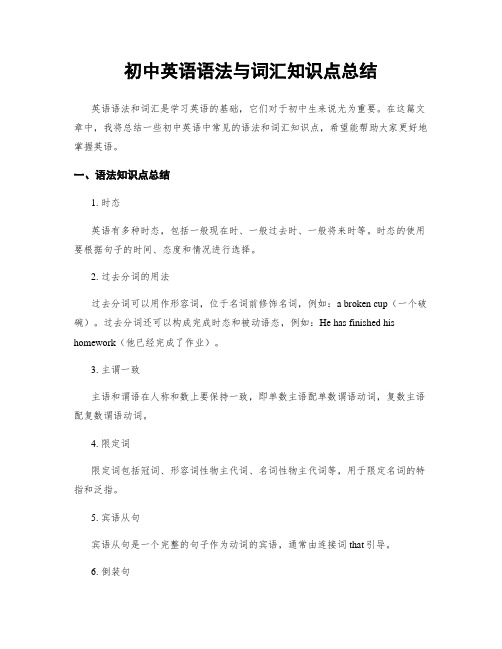
初中英语语法与词汇知识点总结英语语法和词汇是学习英语的基础,它们对于初中生来说尤为重要。
在这篇文章中,我将总结一些初中英语中常见的语法和词汇知识点,希望能帮助大家更好地掌握英语。
一、语法知识点总结1. 时态英语有多种时态,包括一般现在时、一般过去时、一般将来时等。
时态的使用要根据句子的时间、态度和情况进行选择。
2. 过去分词的用法过去分词可以用作形容词,位于名词前修饰名词,例如:a broken cup(一个破碗)。
过去分词还可以构成完成时态和被动语态,例如:He has finished his homework(他已经完成了作业)。
3. 主谓一致主语和谓语在人称和数上要保持一致,即单数主语配单数谓语动词,复数主语配复数谓语动词。
4. 限定词限定词包括冠词、形容词性物主代词、名词性物主代词等,用于限定名词的特指和泛指。
5. 宾语从句宾语从句是一个完整的句子作为动词的宾语,通常由连接词that引导。
6. 倒装句倒装句是一种特殊的语法结构,将谓语动词的全部或部分移到主语之前,通常用于强调句子的某个部分或表示问句。
7. 并列连词常见的并列连词有and、but、or等,用于连接同类型的词、词组或句子。
8. 条件句条件句用于表示假设、条件或可能性,有三种类型:一般条件句、虚拟条件句和非真实条件句。
二、词汇知识点总结1. 动词动词是英语中的重要词类之一,表示动作、状态或存在的词。
常见的动词有run、jump、eat等。
2. 名词名词是表示人、事物、地点或抽象概念的词,可分为可数名词和不可数名词。
常见的名词有cat、desk、love等。
3. 形容词形容词用于修饰名词或代词,表示人或事物的性质、特征或状态。
常见的形容词有beautiful、happy、tall等。
4. 副词副词用于修饰动词、形容词、副词或整个句子,表示时间、地点、方式、程度等。
常见的副词有slowly、quietly、well等。
5. 介词介词用于连接名词或代词与其他词语,表示关系、位置、方向等。
初中英语中考常用词汇词组短语用法区分(共24组)
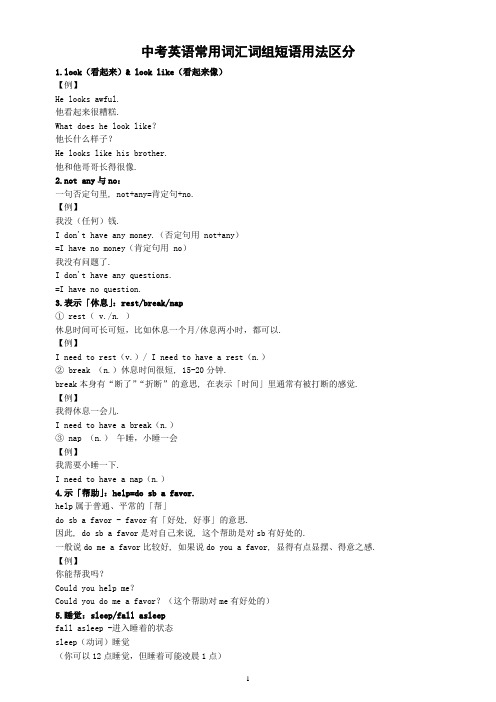
中考英语常用词汇词组短语用法区分1.look(看起来)& look like(看起来像)【例】He looks awful.他看起来很糟糕.What does he look like?他长什么样子?He looks like his brother.他和他哥哥长得很像.2.not any与no:一句否定句里, not+any=肯定句+no.【例】我没(任何)钱.I don't have any money.(否定句用 not+any)=I have no money(肯定句用 no)我没有问题了.I don't have any questions.=I have no question.3.表示「休息」:rest/break/nap① rest( v./n. )休息时间可长可短,比如休息一个月/休息两小时,都可以.【例】I need to rest(v.)/ I need to have a rest(n.)② break (n.)休息时间很短, 15-20分钟.break本身有“断了”“折断”的意思, 在表示「时间」里通常有被打断的感觉. 【例】我得休息一会儿.I need to have a break(n.)③ nap (n.)午睡,小睡一会【例】我需要小睡一下.I need to have a nap(n.)4.示「帮助」:help=do sb a favor.help属于普通、平常的「帮」do sb a favor - favor有「好处, 好事」的意思.因此, do sb a favor是对自己来说, 这个帮助是对sb有好处的.一般说do me a favor比较好, 如果说do you a favor, 显得有点显摆、得意之感. 【例】你能帮我吗?Could you help me?Could you do me a favor?(这个帮助对me有好处的)5.睡觉:sleep/fall asleepfall asleep -进入睡着的状态sleep(动词)睡觉(你可以12点睡觉,但睡着可能凌晨1点)【例】我昨晚12点就睡了, 但1点才睡着.I went to sleep at 12 last night, but I fell asleep at 1.6.in time及时/on time准时比如:约7点见面.in time及时, 指在7点之内就到了, 可能还不到7点就到了.on time准时/按时, on是在...上面, 如果正好在7点上, 等于正好7点准时到.7.征求... ask for....ask sb for permission向某某请求同意ask for sb's permission请求某某的同意2种都可以用8.洗澡:shower/bathtake a shower(淋浴 ,花洒的洗澡)have a bath(泡澡 ,带浴缸的)bath tub浴缸9.工作:job/workjob-工作的名词,找了一份/两份工作work-工作的内容【例】我找到了2份工作.I found two jobs.我的工作没做完.I didn't finish my work.10.想要/需要:want/needwant和need的用法相同, 后面都可以:+to do+sb to do+n.(名词)+to+be+形容词(a.)【例】我需要你的帮助.+n.(名词)I need/want your help.(help在这里是名词)我想要洗澡I need a shower.(+名词)I need to take a shower(+to do)我需要你帮我.+sb to doI need/want you to help me.(help在这里是动词)我想让你开心I want you to be happy.(+形容词)-happy是形容词,前面加be,to后面要加动词,be是系动词,也属于动词的一种综上,有动词+do没有动词:用名词/形容词/介词短语/副词/done,且这些词前面一定要+be动词11.表示「担心」:worried(a.)-状态worry(v.)-动作【例】我不想让你担心.I don't want you to be worried.-句中没有动词,worried是形容词, 前面要加be(只要没有动词,就要+be动词)我真的很担心你.I really worry about you.(worry-动词)12.想要/需要:need/have to口语中都可以表示“得.../不得不.../不用.../不需要.../不必...”我得把作业做了I need/have to finish my homework.(+to do)你得休息了.You need a rest.(+n.)You need/have to rest.(+to do)你不用/不必关心我.You don't have to care about me.13.want/be going to do① want想(要),表示意愿和欲望,都是脑子里的想法,实际上会不会去做未知② be going to do要,准备,打算,表示主语/说话人的计划,基本上要实施(实际生活中,要结合实际情景运用)14.最好...had better (not) do sth.【例】你最好去看医生.You had better go to see a doctor.(也可略写成 You’d better...)15.有...要....have sth to do【例】我有很多作业要做.I have a lot of homework to do.我没钱看电影.I don't have money to watch movie.16.already(已经)&yet(还)① already&yet都是副词(adv.), 在现在完成时中, 可加可不加.-如果加上, 有点儿”锦上添花“的意思.-如果不加, 对「现在完成时强调动作已完成」也不影响.「现在完成时」回顾 :【笔记】0基础入门英语语法 | 时态:现在完成时&一般过去时, 怎么区分?【例】他已经写完作业了.He has finished homework.He has finished homework already.(两句话意思相同)② already用于肯定句, yet多用于否定句/疑问句.【例】他已经写完作业了.He has finished homework already.他还没写完作业.He hasn't finished homework yet.③如果不使用现在完成时(不强调动作已完成), 句中用already&yet, 则表示已经处于某种状态.【例】我已经在路上了.I'm already on the way.他还不是个老师.He is not a teacher yet.(事情还没发生)综上:-句中有动作, 且强调动作已完成, 用现在完成时, 表示「已经/还」, already/yet可加可不加.-句中没有动作, 不强调动作完成, 不用现在完成时, 只强调已经处于某种状态, 要加already/yet.17.表示「还...」:yet&still① yet用于否定句/疑问句, 通常翻译为:还没...② still用于肯定句, 通常翻译为:仍然.../还...【例】他们仍然(还)记得那天.They still remember that day.我还没回家.I'm not home yet.18.表示「再...」again & any more① again用于肯定句/否定句② any more用于否定句/疑问句, 通常翻译为:再也不.../不再....③ again表示「再一次...」,any more既可以表示「程度」,又可以表示「次数」【例】我再也不吃糖了.I will not eat candy again/any more.我再也不会输了.I won't lose again.(下一次不会再输)I won't lose any more.(不会输)非谓语动词做名词(宾语)I(主) like(谓) making friends(宾).I finish doing my homework.(关于「非谓语动词」, 咱后边还会专门讲, 敬请关注~)19.表示「擅长...」be good at doing sth- good是形容词, be good是「系表」结构, 如果前面加上主语, 则结构完整, 后面可以加adv./介词短语.- at是介词, 后面不可能再用动词, 所以doing是把动词加上ing变成名词, 在这里与前面的介词共同构成介词短语.- 用法延伸:be good表示「XXX很好」, good也可以替换成其它表示”好“的形容词:great/fantastic...↓be good/great/fantastic...+at doing sth.20.使动词用法&make两者都有“让某人....”的意思, 区别在于:① make后面只能加使动词的形容词(a.)形式, 构成「主谓宾+宾补」的结构②使动词本身就有“让某人....”的意思综上:make sb +a.(主谓宾宾补)让...disappoint(使动词) sb让...失望=make sb disappointed(a.)=let sb down【例】我不想让你失望.I don't want to disappoint you.I don't want to make you disaapointed.I don't want to let you down.「使动词」相关知识点回顾 :【笔记】英语语法入门到精通(19)| 动词之:使动词(用法&归纳)21.表示「选择」:choice (n.), 复数形式:choiceschoose (v.)【例】菜单上有很多选择, 但我的选择是汉堡 .The menu had a lot of options, but my choice was the burger.我必须在今晚去健身房还是去看电影之间做选择.I have to choose between going to the gym or watching a movie tonight.22.表示「听到/听说」hear(vt)听到, 直接加人/物,都是可以发出声音的hear(vi) +介词of/about-听说【例】我能听到窗外的鸟叫.I can hear(vt.) the birds chirping outside my window.-hear后面直接跟鸟bird, 是可以发声的.我以前从未听说过那个餐厅.I've never heard of that restaurant before.你听说过市中心刚刚开业的新店吗?Have you heard about the new store that just opened downtown?-hear是不及物动词(vi),后面必须加介词, 表示“听说...”23.pick sb up捡起来, 接某人【例】我的朋友下班后要来接我.My friend is going to pick me up after work.24.表示「同意」① agree to 暗示了决定做某事的意愿是由别人提出或请求的, 有被迫同意的意味② agree with 同意某人的观点,它意味着一个人的观点与另一个人的观点是一致的③ agree on 意为与别人达成协议或共同决定。
人教版初中英语九年级一单元词汇要点语法全套解析
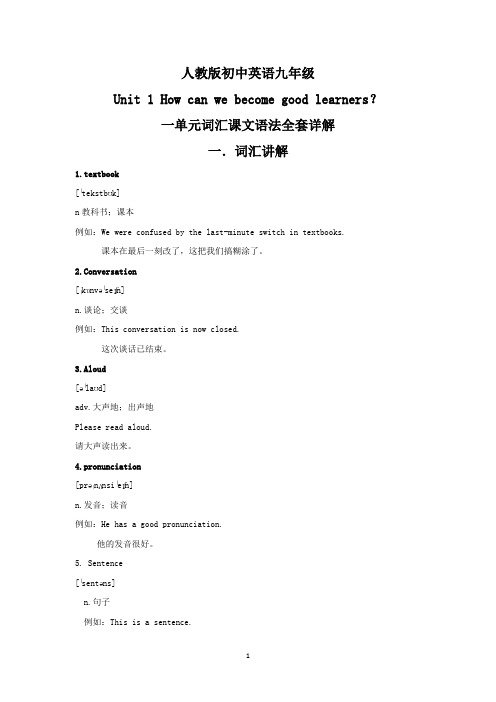
人教版初中英语九年级Unit 1 How can we become good learners?一单元词汇课文语法全套详解一.词汇讲解1.textbook[ˈtekstbʊk]n教科书;课本例如:We were confused by the last-minute switch in textbooks.课本在最后一刻改了,这把我们搞糊涂了。
2.Conversation[ˌkɒnvəˈseɪʃn]n.谈论;交谈例如:This conversation is now closed.这次谈话已结束。
3.Aloud[əˈlaʊd]adv.大声地;出声地Please read aloud.请大声读出来。
4.pronunciation[prəˌnʌnsiˈeɪʃn]n.发音;读音例如:He has a good pronunciation.他的发音很好。
5.Sentence[ˈsentəns]n.句子例如:This is a sentence.这是一个句子。
6.Patient[ˈpeɪʃnt]n.病人;adj.有耐心的例句:Louise was very patient with me when I was ill and crabby.在我生病并且脾气乖戾的日子里,路易斯对我很有耐心。
7.Expression[ɪkˈspreʃn]n.表达;表示;表达方式例句:she looked at her plate with an expression of disgust.她看着她的盘子,脸上露出很厌恶的表情。
8.Discover[dɪˈskʌvə(r)]V.发现,发觉例句:In the 19th century,gold was discovered in California 19世纪时,在加利福尼亚发现了金子。
9.Secret[ˈsiːkrət]adj.秘密的;保密的;n.秘密;秘诀;例句:Soldiers have been training at a secret location.士兵们一直在一个秘密场所训练。
初中英语常用短语词汇知识知识点复习(含答案解析)

一、选择题1.Which of the following ending has the same pronunciation “started”?A.hoped B.needed C.raised D.passed B解析:B【解析】【详解】句意:以下哪个单词结尾的发音与“ started”相同?考查单词的读音。
A. hoped希望;B. needed需要;C. raised提出;D. passed通过。
过去式started动词词尾为“t”,因此ed发/ id /音,hoped和passed动词词尾为清辅音,因此ed发/ t /音,needed动词词尾为“d”,因此ed发/ id /音,与started相同,raised动词词尾为t,d以外之浊辅音,因此ed发/ d /音,故选B。
【点睛】过去式“-ed”的发音规则:(1)动词词尾为“t,d”时,发/ id /音:want →wanted(要);need →needed (需要)。
(2)动词词尾为清辅音时,发/ t / 音:help →helped (帮助);laugh →laughed (笑);lo ok →looked (看);kiss →kissed (吻);wash →washed (洗);watch →watched (注视)。
(3)动词词尾为t,d以外之浊辅音或元音时,发/ d /音:call →called (叫);stay→stayed (停留);cry→cried (哭)。
2.I put my keys in my_____/bæg/.A.big B.box C.bag D.boy C解析:C【解析】【详解】句意:我把钥匙放在我的包里了。
考查语音。
A.big/ bɪg /大的;B. box/bɔks/盒子;C.bag/bæg/包;D.boy/ bɔɪ /男孩;根据语境我把钥匙放在我的包里了,再根据音标提示可知答案是bag,故答案选C。
初中英语核心单词解析之know,knowledge
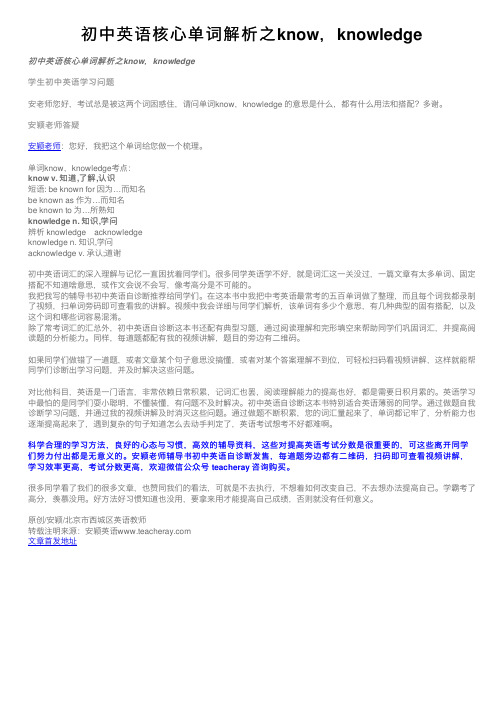
初中英语核⼼单词解析之know,knowledge初中英语核⼼单词解析之know,knowledge学⽣初中英语学习问题安⽼师您好,考试总是被这两个词困惑住,请问单词know,knowledge 的意思是什么,都有什么⽤法和搭配?多谢。
安颖⽼师答疑安颖⽼师:您好,我把这个单词给您做⼀个梳理。
单词know,knowledge考点:know v. 知道,了解,认识短语: be known for 因为…⽽知名be known as 作为…⽽知名be known to 为…所熟知knowledge n. 知识,学问辨析 knowledge acknowledgeknowledge n. 知识,学问acknowledge v. 承认;道谢初中英语词汇的深⼊理解与记忆⼀直困扰着同学们。
很多同学英语学不好,就是词汇这⼀关没过,⼀篇⽂章有太多单词、固定搭配不知道啥意思,或作⽂会说不会写,像考⾼分是不可能的。
我把我写的辅导书初中英语⾃诊断推荐给同学们。
在这本书中我把中考英语最常考的五百单词做了整理,⽽且每个词我都录制了视频,扫单词旁码即可查看我的讲解。
视频中我会详细与同学们解析,该单词有多少个意思,有⼏种典型的固有搭配,以及这个词和哪些词容易混淆。
除了常考词汇的汇总外,初中英语⾃诊断这本书还配有典型习题,通过阅读理解和完形填空来帮助同学们巩固词汇,并提⾼阅读题的分析能⼒。
同样,每道题都配有我的视频讲解,题⽬的旁边有⼆维码。
如果同学们做错了⼀道题,或者⽂章某个句⼦意思没搞懂,或者对某个答案理解不到位,可轻松扫码看视频讲解,这样就能帮同学们诊断出学习问题,并及时解决这些问题。
对⽐他科⽬,英语是⼀门语⾔,⾮常依赖⽇常积累,记词汇也罢,阅读理解能⼒的提⾼也好,都是需要⽇积⽉累的。
英语学习中最怕的是同学们耍⼩聪明,不懂装懂,有问题不及时解决。
初中英语⾃诊断这本书特别适合英语薄弱的同学。
通过做题⾃我诊断学习问题,并通过我的视频讲解及时消灭这些问题。
初中英语考查频率最高的50个短语以及易混易错词汇辨析100组!

初中英语考查频率最高的50个短语以及易混易错词汇辨析100组!1.agree with 同意...的意见(想法)I can’t agree with you about that.就那件事,我无法同意你的看法。
2.1isten to 听…When she arrived, I was listening to English.她来的时候,我正在听英语。
3.get to 到达I get to school at about 7:30 every day,and I get home at 5:00 in the afternoon.我每天7:30到校,下午5:00到家。
4.fall off (从……) 掉下The girl fell off the bike.女孩从自行车上摔了下来。
5.knock at/on 敲(门、窗)There was a heavy knock at the door.有人在猛烈地敲门。
ugh at 嘲笑It’s not good to laugh at a person who is in trouble.讥笑一个陷于困境的人是不好的。
7.1earn(…)from…向…学习...Bob, you should learn from your brother. He does well in his homework.鲍勃,你应该向你哥哥学习。
他的作业完成得很好。
8.1ive on 继续存在;靠…为生People in my hometown live on rice.我家乡的人们靠大米为生。
9.1ook after 照顾,照看I must look after my old grandma when my parents are not at home.父母不在家时,我必须照顾我的老奶奶.10.help…with 帮助…做…My friend helps me with my English study.我的朋友帮助我学习英语。
初中英语语法之动词后跟to do 和doing的短语解析
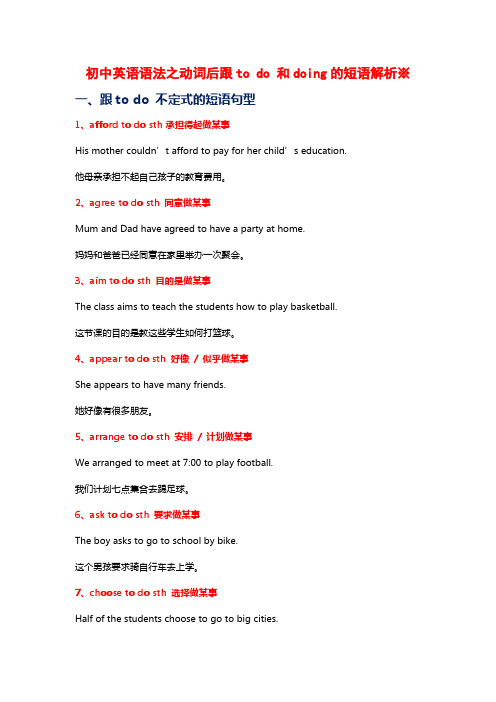
初中英语语法之动词后跟to do 和doing的短语解析※一、跟to do 不定式的短语句型1、afford to do sth 承担得起做某事His mother couldn’t afford to pay for her child’s education.他母亲承担不起自己孩子的教育费用。
2、agree to do sth 同意做某事Mum and Dad have agreed to have a party at home.妈妈和爸爸已经同意在家里举办一次聚会。
3、aim to do sth 目的是做某事The class aims to teach the students how to play basketball.这节课的目的是教这些学生如何打篮球。
4、appear to do sth 好像/ 似乎做某事She appears to have many friends.她好像有很多朋友。
5、arrange to do sth 安排/ 计划做某事We arranged to meet at 7:00 to play football.我们计划七点集合去踢足球。
6、ask to do sth 要求做某事The boy asks to go to school by bike.这个男孩要求骑自行车去上学。
7、choose to do sth 选择做某事Half of the students choose to go to big cities.一半的学生选择去大城市。
8、decide to do sth 决定做某事He decided to be a firefighter.他决定当一名消防员。
9、expect to do sth 期望做某事You can’t expect to learn a foreign language in a few months.你不要指望在几个月内就能学会一门外语。
初中英语核心单词解析之work一词多义与常考短语

初中英语核心单词解析之work一词多义与常考短语学生初中英语学习问题安老师您好,考试总是被这个词困惑住,请问单词work的考点是什么,可数名词和不可数分别有哪些应用?多谢。
安颖老师答疑安颖老师:您好,我把这个单词给您做一个梳理。
单词work核心考点与一词多义:work n.工作;劳动;作品,著作;工厂v.工作,用功;生效;运转短语: work out=figure out解决,计算出;实现;制定出;弄懂;锻炼out of work=lay off失业,下岗The phoneisn’t working.这部电话坏了。
The pills the doctor gave me aren’t working.医生给我的药片不管事。
She’s an artist whose work I really admire.她这位艺术家的作品令我赞赏不已。
I work out regularly to keep fit.我经常锻炼以保持健康。
I couldn’t work out the problem.我解决不了这个问题。
I’ve never been able to work her out.我从未能弄懂她的秉性。
He was out of work when the factory closed.他在工厂倒闭后失业了。
初中英语词汇的深入理解与记忆一直困扰着同学们。
很多同学英语学不好,就是词汇量不过关,一篇阅读文章有太多单词、固定搭配不知道啥意思,或作文会说不会写,像考高分是不可能的。
我把我写的辅导书初中英语自诊断推荐给同学们。
在这本书中我把中考英语最常考的最核心的五百词汇做了整理,而且每个词我都录制了视频,扫单词旁码即可查看我的讲解。
视频中我会详细与同学们解析,这个单词有多少个意思,有几种固定搭配,有哪些典型例句,这个词和哪些词拼写相似,容易混淆。
除了核心词汇与固定搭配的梳理外,初中英语自诊断这本书还配有供同学们演练的典型题,通过阅读理解和完形填空来帮同学们进一步巩固强化词汇,并提高阅读分析和判断能力。
初中英语动词短语辨析教案及解析(1)
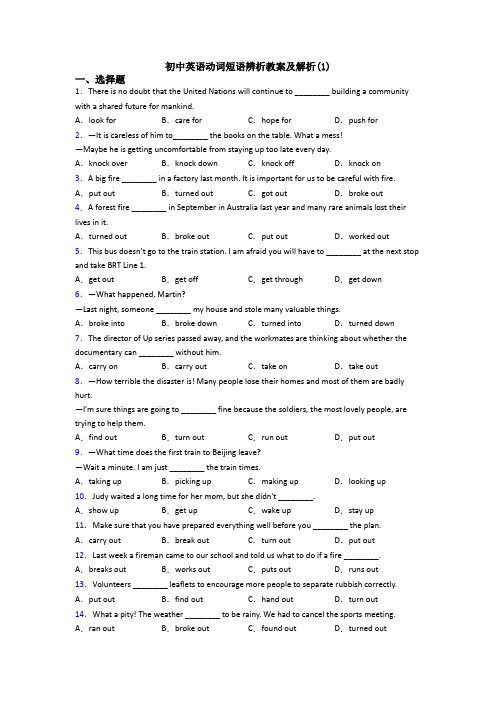
初中英语动词短语辨析教案及解析(1)一、选择题1.There is no doubt that the United Nations will continue to ________ building a community with a shared future for mankind.A.look for B.care for C.hope for D.push for2.—It is careless of him to________ the books on the table. What a mess!—Maybe he is getting uncomfortable from staying up too late every day.A.knock over B.knock down C.knock off D.knock on3.A big fire ________ in a factory last month. It is important for us to be careful with fire. A.put out B.turned out C.got out D.broke out4.A forest fire ________ in September in Australia last year and many rare animals lost their lives in it.A.turned out B.broke out C.put out D.worked out 5.This bus doesn’t go to the train station. I am afraid you will have to ________ at t he next stop and take BRT Line 1.A.get out B.get off C.get through D.get down 6.—What happened, Martin?—Last night, someone ________ my house and stole many valuable things.A.broke into B.broke down C.turned into D.turned down 7.The director of Up series passed away, and the workmates are thinking about whether the documentary can ________ without him.A.carry on B.carry out C.take on D.take out 8.—How terrible the disaster is! Many people lose their homes and most of them are badly hurt.—I’m sure thing s are going to ________ fine because the soldiers, the most lovely people, are trying to help them.A.find out B.turn out C.run out D.put out 9.—What time does the first train to Beijing leave?—Wait a minute. I am just ________ the train times.A.taking up B.picking up C.making up D.looking up 10.Judy waited a long time for her mom, but she didn't ________.A.show up B.get up C.wake up D.stay up 11.Make sure that you have prepared everything well before you ________ the plan. A.carry out B.break out C.turn out D.put out12.Last week a fireman came to our school and told us what to do if a fire ________. A.breaks out B.works out C.puts out D.runs out 13.Volunteers ________ leaflets to encourage more people to separate rubbish correctly. A.put out B.find out C.hand out D.turn out 14.What a pity! The weather ________ to be rainy. We had to cancel the sports meeting. A.ran out B.broke out C.found out D.turned out15.Please _____ the water when you brush your teeth.A.take down B.turn up C.take away D.turn off16.I’ve had some difficulties, but they were nothing compared _____ yours.A.to B.of C.for D.from17.All of us had a good time during this year’s May Day holiday because we ________ five days________ .A.had...off B.took...off C.put...off D.turned...off 18.—Hello, this is Taicang Middle School.—I want to talk to Mr. Chen. Can you ________ me ________?A.put…in B.put…out C.put…through D.put…up19.The rain has stopped. Why not ________ the raincoat?A.take away B.pass away C.put away D.put off 20.There’s no d oubt the Belt and Road will successfully ________ cooperation and development between China and other countries along the line.A.push for B.care for C.look for D.hope for21.The book is written by T. C.Smith.What does the “T. C.”?A.pay attention to B.regard as C.stand for D.set off22.—I ________ reading English every morning.—Yes, English is very important and it ________ the first language in England and some other countries.A.used to; is used by B.used to; is used asC.am used to; is used as D.am used to; is used by23.—How was your May Day holiday?—Just so-so. We drove to Suzhou and tried to find a place for parking, but they were all________. A.turned up B.stayed up C.taken up D.put up 24.Would you please ____________ the light? I can't sleep well with it on.A.turn on B.turn off C.turn to D.turn around 25.—I’m sorry to ________ on you, but there is something I don’t understand.—It doesn’t matter.A.cut down B.cut out C.cut in D.cut off26.Far water does not ________ near fire.A.put up B.put away C.put out D.put in27.—In order to improve my English, I have already made a detailed plan.—Great! I think all you need to do next is _________.A.pick it out B.carry it out C.find it out D.point it out 28.Much to everyone’s surprise, Hi, Mom ________ to be a biggest hit.A.turns out B.puts out C.carries out D.breaks out 29.The job ________ to be harder than they thought.A.found out B.turned out C.ran out D.worked out30.Andrew once tried to ________ a brighter light in his bedroom, but he failed in the end. A.put on B.put in C.put out D.put up31.I promise I won’t ________ any more of your time. But would you please reply to my question right away?A.give up B.make up C.put up D.take up32.-Oh,my God! I have ________ five pounds!-No worries. It’s normal for a growing teenage girl.A.put up B.put down C.put on D.put off 33.—Many students don’t know how to ________ stress and become worried.—I think they’d better ask their teachers for help.A.argue with B.come up with C.deal with34.Bob is busy taking the desks and chairs away because they ___________ too much room in the hall.A.pick up B.take up C.put up D.cheer up 35.—All right, I’ll take it. But I tell you, it is the last time I will _________ this kind of work —Come on, Buddy! Don’t be so serious.A.take off B.take out C.take on D.take up36.— Excuse me, which is the way to Kaiming Middle School?—________ this street, and you’ll find it on your right.A.Write down B.Go down C.Lie down D.Sit down37.As a volunteer, he often goes to the hospital to ________ the sick.A.cheer for B.help for C.put up D.cheer up38.My brother often _________ his spare time to help me with my spoken English.A.puts up B.gives up C.opens up D.tidies up 39.Daniel, stop playing computer games, please! It has ________ your free time too much. A.turned up B.picked up C.put up D.taken up 40.—Why did Linda come to China?—To experience Chinese culture and ________ the most suitable university to attend.A.turn out B.put out C.run out D.find out41.Life is full of ups and downs. When your friends are unhappy, tell them something funny and encourage them to ________.A.put up B.cheer up C.stay up D.give up42.The person who ________ a new idea of how to work out the puzzle will be given a(n)________.A.keeps up with; praise B.comes up with; prize C.ends up with; price D.puts up with; award43.—Your spoken English is very good. How do you improve it?—Thanks. Mrs. Wang always asks us to ________ dialogues in our English classes and practice speaking English as often as possible.A.take up B.make up C.put up D.mop up44.—Who is the best basketball player in your class?—Daniel. And he takes any chance to ________ his sports skills to girls.A.take off B.turn off C.fall off D.show off45.________ the way you talk. You won’t want to make others feel uncomfortable.A.Pay attention to B.Hold on toC.Come up with D.End up with46.If parents do everything for their children, they won’t learn to ________ themselves. A.depend on B.get on C.put on D.come on47.My father is crazy abou t DIY. He’s trying to ________ a cupboard in the kitchen.A.put up B.put in C.put on D.put away48.I know how busy you must be and I wouldn’t want to ________ too much of your time. A.put up B.take up C.set up D.make up 49.—Have you made a plan to raise money to protect the animals in danger?—Yes. Now we are thinking about how to ________.A.pick it out B.carry it out C.find it out D.put it out 50.The baby is sleeping. Would you please ________?A.turned the radio on B.turn the radio downC.turned the radio off D.turn the radio up【参考答案】***试卷处理标记,请不要删除一、选择题1.D解析:D【详解】句意:毫无疑问,联合国将继续推动构建人类命运共同体。
初中英语九年级英语重点词汇短语词义辨析归纳(全一册)

情报”指通过学习、阅读、
那本书获取了一些信息。
观察等方式而得到的信息
为不可数名词,意为“新闻;
消息”,指由广播、电视、 报纸等传播的最新消息。
I watch news on TV every day.我每天在电 视上看新闻。
为可数名词,意为“口信; 消息”,指可以传播的信息。
Can you take some messages for her?你能 捎一些消息给她吗?
Edison invented the electric light. 爱迪生发明了电灯。
辨析so…that…与so that
考点
词义及用法
so…that…
so+adj./adv.+that…意为“如此……以至 于……”,引导结果状语从句
例句
The girl is so young that she can't dress herself.这个女孩还太小,不会自己穿 衣服。
用于做错事道歉、没听清对 Please pardon me for not arriving soon.请原谅我没能 方的话,希望他重复一遍等。早点来。
辨析information,news和message
考点 information
news
message
用法
常用短语
例句
不可数名词,意为“信息; a piece of information I get some information from that book.我从
辨析aloud,loud与loudly
考点
词义及用法
例句
aloud(adv.)
意为“大声地”,与call,shout,cry等 Please read the text aloud.请大声地朗读 连用;意为“出声地”,与read等连用 课文。
初中英语语法专题动词语常用短语
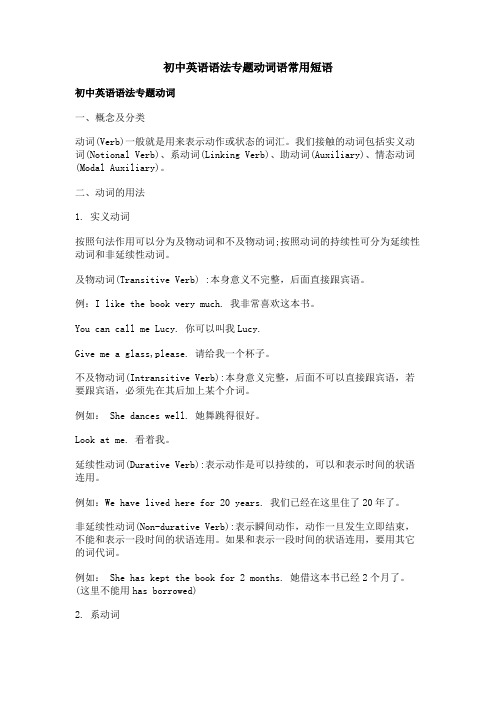
初中英语语法专题动词语常用短语初中英语语法专题动词一、概念及分类动词(Verb)一般就是用来表示动作或状态的词汇。
我们接触的动词包括实义动词(Notional Verb)、系动词(Linking Verb)、助动词(Auxiliary)、情态动词(Modal Auxiliary)。
二、动词的用法1. 实义动词按照句法作用可以分为及物动词和不及物动词;按照动词的持续性可分为延续性动词和非延续性动词。
及物动词(Transitive Verb) :本身意义不完整,后面直接跟宾语。
例:I like the book very much. 我非常喜欢这本书。
You can call me Lucy. 你可以叫我Lucy.Give me a glass,please. 请给我一个杯子。
不及物动词(Intransitive Verb):本身意义完整,后面不可以直接跟宾语,若要跟宾语,必须先在其后加上某个介词。
例如: She dances well. 她舞跳得很好。
Look at me. 看着我。
延续性动词(Durative Verb):表示动作是可以持续的,可以和表示时间的状语连用。
例如:We have lived here for 20 years. 我们已经在这里住了20年了。
非延续性动词(Non-durative Verb):表示瞬间动作,动作一旦发生立即结束,不能和表示一段时间的状语连用。
如果和表示一段时间的状语连用,要用其它的词代词。
例如: She has kept the book for 2 months. 她借这本书已经2个月了。
(这里不能用has borrowed)2. 系动词系动词本身有词义,但不能单独使用,和表语在一起组成主系表结构,说明主语的状态、性质、特征和身份。
常见的系动词如下:be 动词am/is/are/was/were变化系动词get/turn/come/go/become/grow感官系动词feel/sound/look/smell/taste后面必须加形容词保持系动词keep/remain/stay似乎系动词seem例如: I am a student. 我是一个学生。
growth初中英语单词知识点
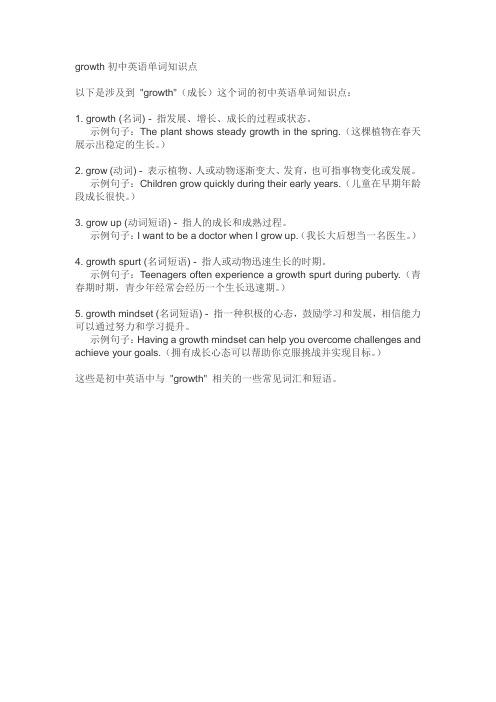
growth初中英语单词知识点
以下是涉及到"growth"(成长)这个词的初中英语单词知识点:
1. growth (名词) - 指发展、增长、成长的过程或状态。
示例句子:The plant shows steady growth in the spring.(这棵植物在春天展示出稳定的生长。
)
2. grow (动词) - 表示植物、人或动物逐渐变大、发育,也可指事物变化或发展。
示例句子:Children grow quickly during their early years.(儿童在早期年龄段成长很快。
)
3. grow up (动词短语) - 指人的成长和成熟过程。
示例句子:I want to be a doctor when I grow up.(我长大后想当一名医生。
)4. growth spurt (名词短语) - 指人或动物迅速生长的时期。
示例句子:Teenagers often experience a growth spurt during puberty.(青春期时期,青少年经常会经历一个生长迅速期。
)
5. growth mindset (名词短语) - 指一种积极的心态,鼓励学习和发展,相信能力可以通过努力和学习提升。
示例句子:Having a growth mindset can help you overcome challenges and achieve your goals.(拥有成长心态可以帮助你克服挑战并实现目标。
)
这些是初中英语中与"growth" 相关的一些常见词汇和短语。
初中英语知识点归纳重点词汇和短语梳理

初中英语知识点归纳重点词汇和短语梳理Introduction:在初中英语学习中,词汇和短语是基础,也是英语学习中最重要的部分之一。
掌握了正确的词汇和短语用法,学生们将能够更好地理解和运用英语,提高听、说、读、写的能力。
本文将梳理初中英语中的重点词汇和短语,帮助学生们进行知识点的归纳和复习。
一、重要词汇梳理:1. school(学校)- a place where students go to receive education.e.g. I go to school from Monday to Friday.2. student(学生)- a person who studies at a school or college.e.g. Tom is a good student. He always gets good grades.3. teacher(老师)- a person who teaches students in school.e.g. My English teacher is very friendly.4. book(书)- a written or printed work consisting of multiple pages bound together.e.g. I like reading books in my free time.5. study(学习)- the act of acquiring knowledge, especially by reading, memorizing, or practicing.e.g. I need to study for the upcoming English test.6. exam(考试)- a formal test of a person's knowledge or proficiency in a subject or skill.e.g. We will have a math exam next week.7. homework(家庭作业)- schoolwork assigned to be done outside of regular class hours.e.g. Don't forget to do your homework before tomorrow's class.8. friend(朋友)- a person whom one knows well and is fond of.e.g. Sarah is my best friend. We always play together.二、常用短语梳理:1. How are you?(你好吗?)- a common greeting in English, used to ask about someone's well-being.e.g. A: How are you? B: I'm fine, thank you. And you?2. What's your name?(你叫什么名字?)- a question used to ask for someone's name.e.g. A: What's your name? B: My name is Alice.3. Where are you from?(你来自哪里?)- a question used to ask about someone's place of origin.e.g. A: Where are you from? B: I am from China.4. Thank you(谢谢)- an expression of gratitude or appreciation.e.g. A: Here is your pen. B: Thank you!5. Can you help me?(你能帮助我吗?)- a question used to ask for assistance.e.g. A: Can you help me with this math problem? B: Sure, I can help.6. I don't know(我不知道)- a phrase used to indicate a lack of knowledge or understanding.e.g. A: What's the answer to this question? B: I don't know.7. See you later(再见)- a common farewell phrase used when parting with someone.e.g. A: Bye, see you later. B: See you later, too.结论:通过对初中英语的重点词汇和短语进行梳理,我们不仅可以加深对这些知识点的了解,还能够提高英语应用能力。
初中英语重要词汇的用法及区别
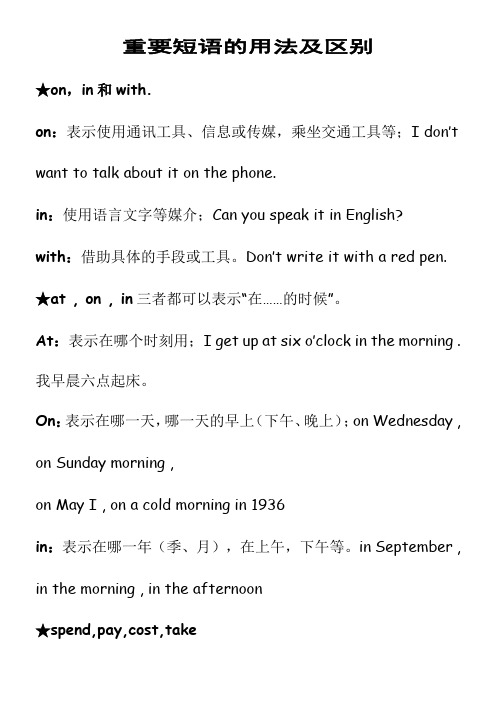
重要短语的用法及区别★on,in和with.on:表示使用通讯工具、信息或传媒,乘坐交通工具等;I don’t want to talk about it on the phone.in:使用语言文字等媒介;Can you speak it in English? with:借助具体的手段或工具。
Don’t write it with a red pen.★at , on , in三者都可以表示“在……的时候”。
At:表示在哪个时刻用;I get up at six o’clock in th e morning . 我早晨六点起床。
On:表示在哪一天,哪一天的早上(下午、晚上);on Wednesday , on Sunday morning ,on May I , on a cold morning in 1936in:表示在哪一年(季、月),在上午,下午等。
in September , in the morning , in the afternoon★spend,pay,cost,takeSb. spend …on sth. 某人花了…(时间、金钱)在某事上。
(in) doing sth. 某人花了…(时间、金钱)做某事。
Sb. pay …for sth.某人为某物花了…钱。
Sth. cost sb. …某物花了某人…钱。
It takes/took sb. … to do sth.花了某人…(时间、金钱)做某事。
★too much, too many, much tootoo much + 不可数名词too many + 可数名词much too + 形容词★not … until &u ntilnot … until直到…才… (主句动词是短暂性动词)until 一直到…(主句中使用延续性动词)★few, a few; little , a little. 虽然都表示“少”,但(1)few, a few是可数的, little, a little是不可数的。
初中英语考试中常见的相似词汇区别用法及其解析总结

1.some 肯定句already肯定句and肯定句too肯定/疑问句any 否定/疑问句yet否定/疑问句or否定/疑问句either否定句1.good well 都有“好”之意 good是形容词well 是副词2. many much 都是“大量的”many+可数名词复数much+不可数名词3. too many too much much too 大量的没有many too词组too many+可数名词复数too much+不可数名词much too+形容词、副词4.each every 都有“每一个的”意思each 可以和of连用every指三者以上的每一个,不能和of连用both指两者都all大于等于三者eithe指两者中的任意一个neither指两者中的一个也没有none指三者中的一个也没有5.other—another—others–the other 与elseother +名词复数another+名词单数others=other+名词复数泛指the other 特指常用于one..the other的句型中else=other+物6. find 找的结果see看的结果hear听的结果Look for 找的动作look at看的动作listen to听的动作7.and-with 和的意思and能做并列主语with不能做并列主语8.hope—wish 希望hope不能加人在加to do,而wish可以.hope to do=wish to do hope +that从句=wish+that从句9.because-because of 因为because+句子because of+短语10arrive—get to –reach 到达arrive 不及物,到达某地要加介词in/at in+大地方at+小地方11.interesting moving amazing surprising amazing(修饰物)interested moved amazed surprised amazed (修饰人)eg:We are moved at the moving film.12.pay spend cost take 这四个词都有花费的意思Sb pay some money for sth.(人做主语,结构是pay….for)Sb spent some money on sth 或sb spend some money (in) doing sth (人做主语,结构为spend on/spend in dong)Sth cost sb some money.(物做主语)It takes sb some time/money to do sth(形式主语it)Eg:我花了五元钱买这本书.( 注意时态用过去时)I paid five yuan for the book. The book cost me five yuan.I spent fiveyuan on the book=I spent five yuan (in) buying the book.It took me five yuan to buy the book13.cross .across. crossing. through .over(常区别across.through与over) across 指在物体的表面穿过through指在物体的空间穿过over指崇山峻岭上穿过 cross是动词across是介词crossing是名词14.in front of (没有范围) in the front of (有一定的范围限制) 在前面Eg:He sat in the front of the bus. The bus 形成一定的范围He sat in front of me.(无范围)15.leave 与forget (忘记) leave+物+地点forget+物不能加地点16.beautiful handsome (漂亮的)beautiful指女性handsome指男性17.in hospital in the hostipal (在医院) 这类词有很多,加the不加the不一样 In hospital 指生病住院in the hospital指在医院工作或去探视18.at table (在吃饭=having meals) at the table 在座子旁边仅指位置19.bring.take.carry.fetch 都有“携带”的意思20bring指带来take指带走fetch指去取回来carry指搬运重物21say-speak-tell-talk说,讲Say指说的内容speak+语言talk指谈话tell讲故事或真理22Stop to do –stop doing 停止做某事(类似的词也很多)Stop to do 指停止一件事情去做另一件事情stop doing指停止正在做的事情23.put on—wear—in—dressPut on 指穿的动作wear指穿的状态in是介词in+颜色dress+人24.ago-before 从前ago是过去时的标志before是完成时的标志25.few—little—a few—a littleFew 表示否定+可数名词复数 a few表示肯定+可数名词复数Little表示否定+不可数名词复数 a little表示肯定+不可数名词复数26.whole—all 整个的whole用在the之后all用在the之前27 ill—sick 有病的都可以做表语,但ill不能做定语sick可以28.win-beat 赢,获胜win+比赛项目beat+人29.too…to –so that—not enough 太…以至于….30.borrow-lend 借borrow指借入,常用于borrow sth from sb lend指借出lend sth to sb 31.alone—loely 单独的alone单独并不孤独lonely单独还有情感上的孤独32.such-so 如此Such+名词so+形容词/副词①so+形+a/an+名= such+a/an+形+名②so+many/much/few/little+形+名③such+形+不可数名词/可数名词复数33.except-beside 除了,除…之外except 指在整体中除去一部分beside指除…之外还有……34.true-real 真实的true指正确与错误real指真假35.forget to do与forget doing remember todo与remember doing Forget to do事情没有做就忘了forget doing指做完了忘了36. used to do--be used to do—be used to doing—be used forused to +动原指过去常常做某事be used to doing 习惯于做某事be used to+动原是被动形式=be used for doing sth 被用于做某事37.look up-- look at—look out—look after—look as—look38.put up—put away—put on—put off39.be made of—be made from-be made in—be made by—be made into-be made up ofbe made of有….构成能看出原材料来(衣服类的全部用be made of)be made from有….构成看不出原材料be made into被制成…..be made in+地点be made by+人be made up of有….组成40.in the way--on the way-- by thewayin the way挡道,妨碍on the way在…的路上by theway顺便问一下41.hundred-thousand—million—billion有具体数字时不加s不加of 无具体数字时加s加ofEg:八百个学生eight hundred students好几百学生hundreds of students42.five years old---five-year-old 五岁43.be good for—be good atbe good for对……有益be good at 擅长…=do well in44.some time—some times—sometime—sometimessome tome指一段时间some times指许多次once twice的累加sometime指将来某时sometimes指有时=at times45.farther—further older—elderfarther指距离上的远近further指程度上的older 纯指年龄上大小elder含指长幼辈份关系46.sound, voice ,noise.sound指自然界各种各样的声音voice指人的嗓音noise指噪音47.a number of,the number ofa number of许多谓语动词用复数the number of…..的总数,谓语动词用单数48.none no one nothingnone(强调有多少) 与all是反义词用how many提问nothing 与no one强调没有nothing指物what提问no one指人用who提问49.fast quickfast指速度快,形副同形quick指时间上快副词是quickly50.join join in take part injoin sb join in+党派,团体take part in+大型的活动,运动51.living alive live lively52put on put off put away put down53. look at look after look up look as。
初中英语基本词汇语法解析以字母U开头的单词
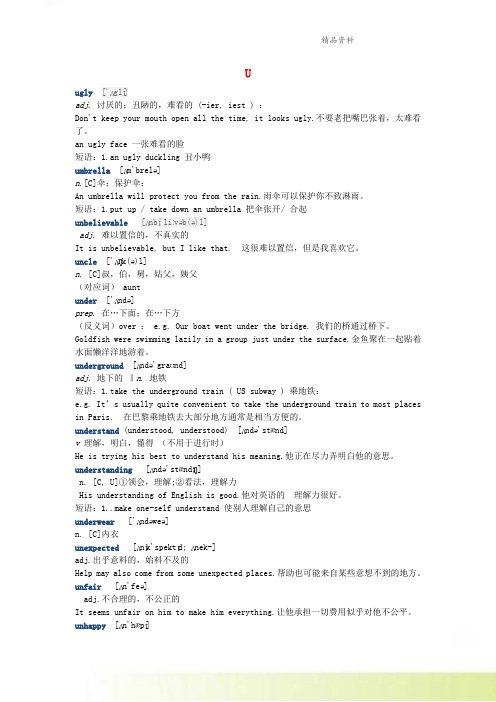
Uugly['ʌglɪ]adj. 讨厌的;丑陋的,难看的 (-ier, iest ) :Don't keep your mouth open all the time, it looks ugly.不要老把嘴巴张着,太难看了。
an ugly face 一张难看的脸短语:1.an ugly duckling 丑小鸭umbrella [ʌm'brelə]n.[C]伞;保护伞:An umbrella will protect you from the rain.雨伞可以保护你不致淋雨。
短语:1.put up / take down an umbrella 把伞张开/ 合起unbelievable[ʌnbɪ'liːvəb(ə)l]adj. 难以置信的,不真实的It is unbelievable, but I like that. 这很难以置信,但是我喜欢它。
uncle ['ʌŋk(ə)l]n. [C]叔,伯,舅,姑父,姨父(对应词) auntunder ['ʌndə]prep. 在…下面;在…下方(反义词)over : e.g. Our boat went under the bridge. 我们的桥通过桥下。
Goldfish were swimming lazily in a group just under the surface.金鱼聚在一起贴着水面懒洋洋地游着。
underground [ʌndə'graʊnd]adj. 地下的‖n. 地铁短语:1.take the underground train ( US subway ) 乘地铁:e.g. It’s usually quite convenient to take th e underground train to most places in Paris. 在巴黎乘地铁去大部分地方通常是相当方便的。
初中英语介词和介词短语知识点精解

初中英语介词和介词短语知识点精解介词是连接词汇与词汇之间,短语与短语之间,句子与句子之间的一个重要类别。
它在句子中常常作状语、定语、宾语等成分,用来说明动作的方式、时间、地点、目的等。
介词短语由介词加上它的补语(通常是名词、代词或名词性短语)组成。
初中阶段是学习英语语言基础的重要时期,掌握好介词和介词短语的用法非常重要。
本文将重点解析初中英语中介词和介词短语的知识点。
一、介词的基本用法1. 表示时间:on, in, at- on用于特定的日期或星期几,如on Monday(在星期一)、onJuly 1st(在7月1日)。
- in用于年、季节、月份等宽泛的时间段,如in 2022(在2022年)、in summer(在夏季)。
- at用于具体的时刻,如at 9 o'clock(在九点钟)。
2. 表示地点:in, on, at- in用于大的区域或范围,如in the city(在城市里)、in China(在中国)。
- on用于具体的位置或表面,如on the table(在桌子上)、on the wall(在墙上)。
- at用于特定的位置或建筑物,如at the bus stop(在公交车站)、at school(在学校)。
3. 表示方式:by, with- by表示通过某种方式或方法,如by bus(乘坐公交车)、by email (通过电子邮件)。
- with表示使用某种工具或伴随某人做某事,如write with a pen(用钢笔写)、go shopping with friends(和朋友一起购物)。
4. 表示原因:for, because of- for表示出于某种目的或原因,如study hard for good grades(为了取得好成绩)、thanks for your help(感谢你的帮助)。
- because of用于说明某种原因,如because of the rain(因为下雨)。
初中英语 基本词汇语法解析 以字母W开头的单词

Wwait [weɪt]v .等候;等待:e.g. Wait a minute. 请稍候。
I’m sorry to keep you waiting. 抱歉,让你久等了。
短语:1. wait for… :等候…Who are you waiting for ? 你在等谁呢?2. wait for sb. to do sth :等某人做某事wake (woke \ waked , woken \ waked ) [weɪk]v○1.醒, 醒来○2唤醒或弄醒某人:e.g. What time do you usually wake ( up ) in the morning ?你平常早晨几点钟醒?e.g. Try not to wake the baby (up) ? 别把孩子吵醒了。
walk[wɔːk]v. 走;行走:‖n ○1. 行走;步行:○2. 散步:○3. 步行距离:e.g. I walk to school. = I go to school on foot. 我步行到学校去。
e.g. It is a long walk to the town. 到城里要走很长的路程。
e.g.Let's go for a short walk. 咱们去散散步吧!e.g. a 20-minute walk from here 从这里走20分钟的路程wall [wɔːl]n. 墙壁;围墙:e.g. We have painted all the walls white. 我们把所有的墙壁都漆成了白色。
There was a wall around the park. 公园四周有围墙。
wallet[ -W-011t]n. [C〕钱包My wallet has disappeared from the table.我放在桌子上的钱包不见了。
want [wɒnt]v. ○1.(常与to连用)要,想要;想得到:○2. 需要:e.g. Did You Want to Tell Me something? 你想告诉我什么吗?His wife wanted him to repair their son's bicycle!他妻子叫他去给他们的儿子修理自行车!They want good jobs. 她们想要好的工作。
- 1、下载文档前请自行甄别文档内容的完整性,平台不提供额外的编辑、内容补充、找答案等附加服务。
- 2、"仅部分预览"的文档,不可在线预览部分如存在完整性等问题,可反馈申请退款(可完整预览的文档不适用该条件!)。
- 3、如文档侵犯您的权益,请联系客服反馈,我们会尽快为您处理(人工客服工作时间:9:00-18:30)。
A.look aroundB.look throughC.look upD.look after
9.— Have you heard that there’s a big fire near your home last night?
— Sure. Luckily, the firemen came quickly and ______ the fire.
---You must be kidding. I felt _______ among those successful people.
A.confident; out of B.nervous; out of shape C.relaxed; out of place
20.---Mum, I think I need a bigger room.
考点:考查固定短语的用法。
8.B
解析:B
【解析】
【详解】
句意:——安迪,请你仔细检查我的报告,看看有没有错误?——当然我会的。考查动词短语。A. look around四下观望;B. look through浏览、仔细检查;C. look up查找;D. look after照顾、照看。根据语境“——安迪,请你我的报告,看看有没有错误?——当然我会的。”可知应是“仔细检查”,故答案选B。
一、选择题
1.—Do you have any problems _____ your English?
—Yes, I have some difficulties _____ texts.
A.with; readingB.read; studyC.with; studyD.in; with
2.—How much chocolate ice cream would you like, Linda?
A.has gone to B.has been to C.has arrived in D.has been in
16.—When do you think is the best time to visit Yancheng?
—Youcome here in spring or autumn. The weather is quite pleasant.
---Yes. She always _____ her toys after playing with them.
A.looks for
B.puts away
C.sweeps away
D.pays for
【参考答案】***试卷处理标记,请不要删除
一、选择题
1.A
解析:A
【解析】
【分析】
【详解】
句意:——你的英语有什么问题吗?——是的,我读课文有点困难。考查介词辨析和动词形式辨析。have some problems with sth.在某些方面有些问题,have some difficulty in doing sth.做某事有些困难;这两个都是固定短语,根据句意,可知选A。
A.had better B.would rather C.have to D.would like
17.I have a poor memory so I have to ______ my phone number book every time I want to make a call.
A.look up B.look at C.look for D.look over
2.C
解析:C
【解析】
【分析】
【详解】
句意:-Linda,你想要多少巧克力冰淇淋?-很多,它是我的最爱。Only a little只一点;Just a few仅仅一点儿,修饰可数名词;A lot很多;None一个也没有。根据句意It’s my favorite可知,Linda非常喜欢巧克力冰淇淋,所以她应该是要很多。故选C。
A.came out B.broke out C.put out D.cut out
10.—Who is your favorite singer, Mike?
—TF Boys. They are very ____ boys and girls.
A.proud ofB.popular with
C.strict withD.worried about
18.—Sandy, you’d better _____ your notes before you do your homework every evening.
—OK, I will, mum.
A.look throughB.look outC.look afterD.look around
19.---Jack, you seemed _______ at the party.
A.too much;too manyB.too many;too much
C.much too;too muchD.too much;much too
6.George couldn’t wait to _________ his new car.
A.put offB.set offC.take offD.show off
A.In factB.As a resultC.HoweverD.Moreover
14.—It’s everyone’s duty to join the Clean Your Plate Campaign.
—Sure. We should try to _______all the food that we’ve ordered.
---You should throw away your old toys. They have _______ too much space.
A.taken up B.taken place C.taken off
21.---Putin _______ the other candidates and was elected president for his fourth time.
6.D
解析:D
【解析】
【详解】
句意:George迫不及待地炫耀他的新车。put off推迟;set off动身,出发;take off起飞,脱下;show off炫耀。根据句意…his new car可知,这里表示“炫耀新车”,故选D。
7.B
解析:B
【解析】
试题分析:句意:首先,网络仅仅是被政府使用。但是,现在它被广泛地应用在每一个领域。分析选项:as usual通常;at first首先;after all毕竟;so far到目前为止。联系实际就用首先之意。故选B
A.put offB.get offC.take offD.go off
4.David promised that he would come to the party, but he didn’t ________.
A.stay upB.grow upC.wake upD.show up
5.My cousin isheavy because he often eatsfast food.
7.________, the Internet was only used by the government. But now it’s widely used in every field.
A.As usualB.At firstC.After allD.So far
8.—Andy, would you pleasethe report for me and see if there is any mistake?
—She is a good and caring one. Though her teaching stylethat of most other teachers, she always has more creative teaching methods than others do.
A.is similar toB.is similar asC.the same as
11.Vivien worked very hard at all her lessons. __________, she became the top student in her class.
A.In order toB.As a resultC.As usualD.For example
12.—What do you think of your English teacher?
---Yes. Putin is very popular. His votes were far _______ the others’ in the election.
A.beat; ahead of B.defeated; better than C.won; in front of
22.一Most of the wild animals arebecause of their bad living environment.
3.B
解析:B
【解析】
【分析】
【详解】
句意:-直到公交车停下来我们才应该下车。-那是对的,安全第一。put off推迟;get off下车;take off脱掉;起飞;go off离开;爆炸。根据句意…the bus until the bus stops和Safety comes first可知,这里表示“下公交车”,故应选B。
4.D
解析:D
【解析】
【详解】
句意:大卫答应他会来参加晚会,但他没有来。A. stay up熬夜;B. grow up成长;C. wake up醒来;D. show up出现。根据本题语境David promised that he would come to the party,but前后表示转折关系,答应要来,但是他没有出现,故选D。
